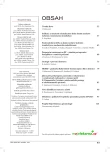-
Medical journals
- Career
New Classificati on of Disease and He alth
Authors: D. Bruthansová; A. Červenková; V. Jeřábková
Authors‘ workplace: Výzkumný ústav práce a soci álních věcí, v. v. i., Praha
Published in: Čes Ger Rev 2009; 7(2): 90-96
Overview
There currently exist two systems of classification for health care and soci al care in the Czech Republic. There is the generally known and time – tested Internati onal Classificati on of Dise ases in its 10th versi on (in short ICD - 10). Then there is the Internati onal Classificati on of Functi oning, Disability and He alth (in short ICF), which was added in 2008. Given the different use and purpose of e ach classificati on, we expect that both of them will gradu ally coexist in practice. The ICD - 10 is the internati onal standard di agnostic classificati on for all general epidemi ological, many he alth management purposes and clinical use. It provides common basis for internati onal comparisons of mortality and morbidity. The ICF is a classificati on of he alth and he alth‑related domains. It presents a framework for me asuring he alth and disability at both individu al and populati on levels. ICF understands the noti ons of ‘he alth’ and ‘disability’ in a new light: ‘Disability is a functi onal limitati on at body, individu al or soci ety level which happens when an individu al with his he alth level meets environmental barri ers’. Everybody may experi ence decre ased he alth and therefore feel certain level of disability. ICF takes into acco unt also soci al consequences of disability and is therefore especi ally well suited for classifying he alth situ ati on of older populati on.
Keywords:
Internati onal Classificati on of Dise ases – Internati onal Classificati on of Functi oning, Disability and He alth – disability – activity – participati on – soci al care – older populati on
Sources
1. Bruthansová D, Červenková A, Jeřábková V et al. Podpora zdraví u zaměstnanců v předdůchodovém a důchodovém věku. Příspěvek pro 12. pražské gerontologické dny 2008.
2. Kalvach Z, Zadák Z, Jirák R et al. Geri atri e a gerontologi e. Praha: Grada 2004 : 118 – 119.
3. Holmerová I, Jurašková B, Zikmundová K. Vybrané kapitoly z gerontologi e. 2. dopl. vyd. Praha: E - Verlag 2007 : 9.
4. MKF. Mezinárodní klasifikace funkčních schopností, disability a zdraví. 1. vyd. Praha: Grada 2008 : 9, 32.
5. Švestková O. a kol. Metodika hodnocení funkčních činností a pracovního potenci álu. Praha: Rozvojové partnerství PENTACOM 2008.
6. Švestková O. Základní informace a praktické využití Mezinárodní klasifikace následků onemocnění a úrazů WHO. Praktický lékař 2002; 2 : 90 – 92.
7. Durdisová J. Ekonomika zdraví. Praha: Oeconomica 2005.
8. Švestková O, Pfeiffer J. Praktické po užití Mezinárodní klasifikace funkční schopnosti, disability a zdraví WHO. Postgradu ální medicína 2004; 3 : 284 – 286.
9. Šteflová A. Využití nástrojů podpory zdraví na pracovišti u stárno ucí ekonomicky aktivní populace v evropských státech. Disertační práce. Praha: 3. LF UK 2007.
10. Pfeiffer J. Mezinárodní klasifikace funkční schopnosti, disability a zdraví (Internati onal Classificati on of Functi oning, Disability and He alth) a její přínos pro lékařsko u posudkovo u službu. In: Bruthansová D, Červenková A. Vývoj invalidity v ČR a ve vybraných zemích EU. Praha: VÚPSV 2002 : 38 – 42.
Labels
Geriatrics General practitioner for adults
Article was published inCzech Geriatric Review

2009 Issue 2-
All articles in this issue
- Indications for and opportunities provided by recanalization therapy of cerebral ischaemia, intravenous thrombolysis
- Endovascular tre atment in acute stroke – thrombolysis and mechanical embolectomy
- Postoperative confusion at ICU – an important perioperative complication in older patients
- Strategi es to reduce risk of dementi a: A revi ew
- MOBID-2 useful pain scale suitable not only for people with dementia
-
What kind of care is provided to patients with incontinence in residential facilities and home care?
II. Diagnostic, treatment and nursing interventions in incontinent persons - New Classificati on of Disease and He alth
- Pressure Ulcers according to EPUAP
- Czech Geriatric Review
- Journal archive
- Current issue
- Online only
- About the journal
Most read in this issue- Postoperative confusion at ICU – an important perioperative complication in older patients
- Pressure Ulcers according to EPUAP
- New Classificati on of Disease and He alth
- MOBID-2 useful pain scale suitable not only for people with dementia
Login#ADS_BOTTOM_SCRIPTS#Forgotten passwordEnter the email address that you registered with. We will send you instructions on how to set a new password.
- Career

